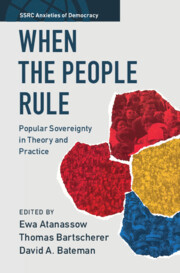66 results

When the People Rule
- Popular Sovereignty in Theory and Practice
-
- Published online:
- 23 November 2023
- Print publication:
- 09 November 2023
-
- Book
-
- You have access
- Open access
- Export citation
Part III
-
- Book:
- When the People Rule
- Published online:
- 23 November 2023
- Print publication:
- 09 November 2023, pp 255-334
-
- Chapter
-
- You have access
- Open access
- HTML
- Export citation
Copyright page
-
- Book:
- When the People Rule
- Published online:
- 23 November 2023
- Print publication:
- 09 November 2023, pp vi-vi
-
- Chapter
-
- You have access
- Open access
- HTML
- Export citation
Index
-
- Book:
- When the People Rule
- Published online:
- 23 November 2023
- Print publication:
- 09 November 2023, pp 373-392
-
- Chapter
-
- You have access
- Open access
- HTML
- Export citation
Select Bibliography
-
- Book:
- When the People Rule
- Published online:
- 23 November 2023
- Print publication:
- 09 November 2023, pp 335-370
-
- Chapter
-
- You have access
- Open access
- HTML
- Export citation
Figures
-
- Book:
- When the People Rule
- Published online:
- 23 November 2023
- Print publication:
- 09 November 2023, pp ix-x
-
- Chapter
-
- You have access
- Open access
- HTML
- Export citation
Preface and Acknowledgments
-
- Book:
- When the People Rule
- Published online:
- 23 November 2023
- Print publication:
- 09 November 2023, pp xv-xviii
-
- Chapter
-
- You have access
- Open access
- HTML
- Export citation
Sponsored by the Social Science Research Council
-
- Book:
- When the People Rule
- Published online:
- 23 November 2023
- Print publication:
- 09 November 2023, pp iii-iv
-
- Chapter
-
- You have access
- Open access
- HTML
- Export citation
Contents
-
- Book:
- When the People Rule
- Published online:
- 23 November 2023
- Print publication:
- 09 November 2023, pp vii-viii
-
- Chapter
-
- You have access
- Open access
- HTML
- Export citation
Table of Cases
-
- Book:
- When the People Rule
- Published online:
- 23 November 2023
- Print publication:
- 09 November 2023, pp xix-xx
-
- Chapter
-
- You have access
- Open access
- HTML
- Export citation
Epilogue
- from Part III
-
- Book:
- When the People Rule
- Published online:
- 23 November 2023
- Print publication:
- 09 November 2023, pp 320-334
-
- Chapter
-
- You have access
- Open access
- HTML
- Export citation
Notes on Contributors
-
- Book:
- When the People Rule
- Published online:
- 23 November 2023
- Print publication:
- 09 November 2023, pp xi-xiv
-
- Chapter
-
- You have access
- Open access
- HTML
- Export citation
Part I
-
- Book:
- When the People Rule
- Published online:
- 23 November 2023
- Print publication:
- 09 November 2023, pp 21-110
-
- Chapter
-
- You have access
- Open access
- HTML
- Export citation
Speeches
-
- Book:
- When the People Rule
- Published online:
- 23 November 2023
- Print publication:
- 09 November 2023, pp 370-372
-
- Chapter
-
- You have access
- Open access
- HTML
- Export citation
7 - The Sovereign People and the Liberal Democratic State
- from Part II
-
-
- Book:
- When the People Rule
- Published online:
- 23 November 2023
- Print publication:
- 09 November 2023, pp 139-157
-
- Chapter
-
- You have access
- Open access
- HTML
- Export citation
Introduction
-
-
- Book:
- When the People Rule
- Published online:
- 23 November 2023
- Print publication:
- 09 November 2023, pp 1-20
-
- Chapter
-
- You have access
- Open access
- HTML
- Export citation
Part II
-
- Book:
- When the People Rule
- Published online:
- 23 November 2023
- Print publication:
- 09 November 2023, pp 111-254
-
- Chapter
-
- You have access
- Open access
- HTML
- Export citation
Unsupervised high-frequency smartphone-based cognitive assessments are reliable, valid, and feasible in older adults at risk for Alzheimer’s disease
-
- Journal:
- Journal of the International Neuropsychological Society / Volume 29 / Issue 5 / June 2023
- Published online by Cambridge University Press:
- 05 September 2022, pp. 459-471
-
- Article
- Export citation
Judicial Power and the Shifting Purpose of Article V
-
- Journal:
- Studies in American Political Development / Volume 36 / Issue 2 / October 2022
- Published online by Cambridge University Press:
- 07 June 2022, pp. 84-103
-
- Article
- Export citation
The Right of Instruction and Representation in American Legislatures, 1778 to 1900. By Peverill Squire. Ann Arbor: University of Michigan Press, 2021. 216p. $80.00 cloth.
-
- Journal:
- Perspectives on Politics / Volume 19 / Issue 4 / December 2021
- Published online by Cambridge University Press:
- 09 December 2021, pp. 1324-1325
- Print publication:
- December 2021
-
- Article
- Export citation



